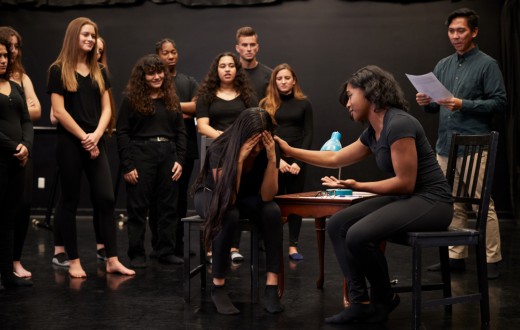Pen in hand, you are about to sign a contract for your latest acting gig as so many questions pop into your head…
Is this contract worded fairly? How will my image be used, exactly? Should I really sign away the rights to ‘everything in the universe known or not known’ because that wording sounds kind of crazy to me!
Indeed, signing a contract can be both nerve-racking and intimidating to many actors, especially those without union, legal or agent/manager representation. So, NYCastings sought help from one of our own – Attorney and Actor Robert Sciglimpaglia.
Robert Sciglimpaglia knows the ins and outs of both law and entertainment. After graduating from Pace University School of Law, Robert passed the Connecticut, New York and Pennsylvania bar exams on his first attempt. Currently, Robert works as a practicing attorney, as well as an actor and accomplished voice over artist. He even hosted a radio show called, “Ask the Lawyer.”
We did ask – and Robert answered!
Legal guidance from Robert Sciglimpaglia:
Q: For Non-Union contracts, what key words/phrases should an actor look out for to protect themselves?
This is a tough one because most of the time Contracts that are signed by Actors are one sided in favor of the Producer, so there are a couple of things I would look out for, 1) Any clause that says the work can be used in perpetuity for any purpose, should try to be limited, ie, to non pornography or other areas that an actor may want limited. 2) I would like to see a hold harmless clause put in there to protect the ACTOR, meaning it should say that the Producer will hold the Actor harmless for any lawsuits brought against the actor as a result of the production. I have seen hold harmless clauses where the ACTOR agrees to hold the PRODUCERS harmless, including paying the Producers attorneys fees! This clause should definitely be stricken by the Actor.
Q: Are there any terms that specifically could limit an actor’s future work?
In commercial contracts, it is standard practice that you can’t work for a competitor’s product as it is considered a conflict. So, I would try to put a time or geographic limit on these clauses in the contracts so a non union actor is not FOREVER barred from acting in a competitors commercial, for instance, Coke vs. Pepsi. If you do a local Coke Commercial, I would say something like the actor is only barred from acting in a Pepsi commercial in the same area where the actor’s spot is running, and for the time period the spot is running.
Q: Do non-union actors have the right to ask for more payment if the project will end up being in many more mediums than originally expected? (i.e.: the post said industrial but the paper work says industrial, print, web, etc.)
That needs to be spelled out in the contract, and it SHOULD be addressed by the actor where if, suddenly, say a Spec Commercial (which would be considered an industrial) becomes nationally broadcast, the actor has the right to be paid broadcast rates when it starts airing. If it is a buy out in the contract, where the actor is being paid once and bought out then the producers have the right to use that recording for any purpose in the future.
Q: Often, contracts have a clause such as “everything known and unknown in the universe” – why do companies include this?
 This is more common now with technology emerging, like the internet, Netflix, the Ipad, etc. Producers want the right to play the pieces on all of these new media outlets. An actor can certainly negotiate for limits to the media the piece will run, and for additional compensation for future media.
This is more common now with technology emerging, like the internet, Netflix, the Ipad, etc. Producers want the right to play the pieces on all of these new media outlets. An actor can certainly negotiate for limits to the media the piece will run, and for additional compensation for future media.
Can/should an actor do anything about it?
Yes, if the work is a buy out. The actor needs to specify that future uses of the work, in whole or in part, need to be compensated, or the Producers will have the right to use them forever.
Q: What clause could an actress/actor add to a contract that contains partial/full nudity or simulated sex to be protected at the same level that SAG people are protected?
The SAG language is perfect to put in the non union contracts, where actual sex is not allowed, the sets need to be closed, etc. I would just use that same clause and insert it into the Non Union contract because it exists to protect actors from these situations.
Q: How can an actor better protect themselves when agreeing to partial/full nudity or simulated sex issues (i.e. make sure that it cannot be used on the Internet, that no one is taping or taking pictures, etc?)
Again, like any other contract that is bought out, it is up to the actor to make sure that the contract specifically spells out how that piece will be used, or else the producers will be able to use it for any purpose.
Q: If an actor discovers their project in use for something beyond what the contract allows – what can a non-union actor do?
 If it is spelled out in the contract what the uses are for the piece, and the producers breach that clause, an actor has the right to sue to recover damages.
If it is spelled out in the contract what the uses are for the piece, and the producers breach that clause, an actor has the right to sue to recover damages.
Q: Are there inexpensive ways for actors to get solid law advice on contracts?
Unions, of course, provide legal services to their members. Volunteer Lawyers for the Arts vlany.org, is a great organization that helps starving artists, and there are attorneys out there that know what actors go through, (including me, since I am one), that charge very reasonable rates to review contracts.
Q: As a lawyer and an actor – are there any contract challenges that you’ve come across that you want to share with other actors, to help them avoid it?
 There was one time when I went to a non union audition and the producer requested that I sign a talent release that basically said the producer had the right to use my audition for any purpose, including on the internet, etc. I refused to sign, so they said I could not audition unless I signed, so I left. That is ridiculous. You should NOT have to sign a talent release until you actually do the job. I have had times where the producers had me sign a release saying I agreed to be filmed at an audition and the recording would be shared with the producers in the audition process, and that if I got the job, the tape could be released. That is fairly normal release to sign at an audition, but a full talent release giving them full rights to your audition was very fishy to me. It was a sign that the producers did not know what they were doing, or they were trying to rip me off. Either way, I pass. No actor should be so desperate that they lose their morals or common sense.
There was one time when I went to a non union audition and the producer requested that I sign a talent release that basically said the producer had the right to use my audition for any purpose, including on the internet, etc. I refused to sign, so they said I could not audition unless I signed, so I left. That is ridiculous. You should NOT have to sign a talent release until you actually do the job. I have had times where the producers had me sign a release saying I agreed to be filmed at an audition and the recording would be shared with the producers in the audition process, and that if I got the job, the tape could be released. That is fairly normal release to sign at an audition, but a full talent release giving them full rights to your audition was very fishy to me. It was a sign that the producers did not know what they were doing, or they were trying to rip me off. Either way, I pass. No actor should be so desperate that they lose their morals or common sense.
THANK YOU Robert for your time and insight!
For more information on Robert Sciglimpaglia visit http://www.robpaglia.com/ or become a Facebook Fan at: www.facebook.com/pages/Robert-Sciglimpaglia/127812936384







